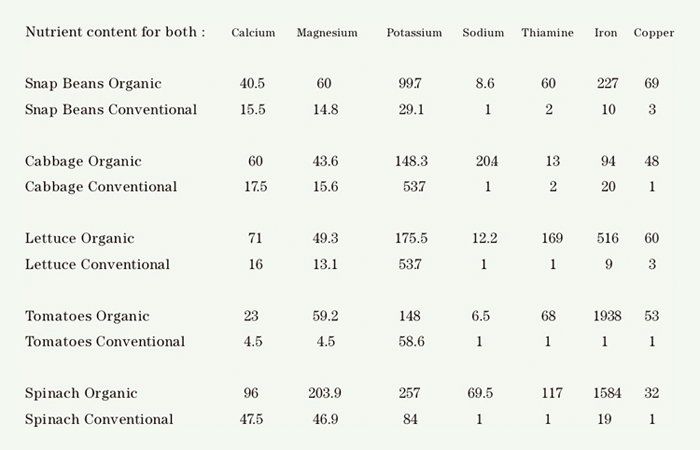| |
Why is Organic Food Better for Your Health  |
| |
| |
| |
|
Here's some of the evidence that Sir John Krebs, Head of UK's Food Standards Agency refuses to acknowledge in his persistent denigration of organic agriculture. Less chemical residues A comprehensive Soil Association review of scientific research has shown that, on average, organic food is better for us than non-organic food. First, it is safer, as organic farming prohibits routine pesticide and herbicide use, so chemical residues are rarely found. In contrast, non-organic food is likely to be contaminated with residues that often occur in potentially dangerous combinations.
The British Society for Allergy, Environmental and Nutritional Medicine states on the back cover of the report: "We have long believed the
micronutrient deficiencies common in our patients have their roots in the mineral-depletion of soils by intensive agriculture, and suspect that pesticide exposures are contributing to the alarming rise in allergies and other illnesses". The negative effects of presticides on health include neurotoxicity, disruption of the endocrine system, carcinogenicity and immune system suppression.
The impacts of dietary exposure to pesticide residues at levels typically found in and on food are less easy to establish, but a precautioanry approach is necessary. While there are recommended safety levels for pesticiders, various governments own tests have shown that average residue levels on foods may be under-reported.
Research has also suggested that pesticide exposure affects male reproductive function, resulting in decreased fertilizing ability of the sperm and reduced fertilization rates. Correspondingly, members of a Danish organic farmers’ association, whose intake of organic dairy products was at least 50% of total intake of dairy products, had high sperm density. In another study, sperm concentration was 43.1% higher among men eating organically produced food. Children, in particular, may stand to benefit from organic food. Scientists monitored preschool children in Seattle, Washington to assess their exposure to organophosphorus (OP) pesticide from diet.
The total dimethyl metabolite concentration was approximately six times higher for children with conventional diets than those with organic diets. The calculated dose estimates suggest that consumption of organic fruits, vegetables and juice can reduce children’s exposure levels from above to below the US Environmental Protection Agency’s guidelines, thereby shifting exposures from a range of uncertain risk to a range of negligible risk. The study concluded that consumption of organic produce could be a relatively simple way for parents to reduce children’s exposure to OP pesticides. Healthier and more nutritious.
Additionally, organic food production bans the use of artificial food additives such as hydrogenated fats, phosphoric acid, aspartame and monosodium glutamate, which have been linked to health problems as diverse as heart disease, osteoporosis, migraines and hyperactivity. Furthermore, while plants extract a wide range of minerals from the soil, artificial fertilisers replace only a few principal minerals. There is a clear long-term decline in the trace mineral content of fruit and vegetables, and the influence of farming practices needs to be investigated more thoroughly.
The Soil Association review found that on average, organic food has higher vitamin C, higher mineral levels and higher phytonutrients than conventional food. Conventional produce also tends to contain more water than organic produce, which contains more dry matter (on average, 20% more) for a given total weight. Thus, the higher cost of fresh organic produce is partly offset by purchasers of conventional produce paying for the extra weight of water and getting only 83% of the nutrients, on average, available in organic produce. The higher water content also tends to dilute nutrient content.
|
|
|
| |
|
|
| |
Certified Organic  |
| |
| |
| |
Certified Organic is a term that specifies the types of additives that can be applied to an agricultural field. This additives (amendments) are substances that farmers put into their fields to grow things. These substances should be naturally found in the environment. Items that are naturally found in the environment and are chemically altered from their original form are not considered organic. The substances that organic farmers can use are limited to items that are naturally found in our environment like: animal manures, worm castings, seaweed, bat guano, blood meal, fish meal, feahther meal and compost.
Numerous researches have shown how the nutrient content of organically grown produce fast exceeds that of conventionally grown products.
|
|
|
| |
|
|
| |
Organic Vs. Conventional  |
| |
| |
| |
|
Organic vs. Conventional Produce
The diagram shows a comparative analysis of the nutrient content of organic and nonorganic food from the Firman Bear Report, Rutgers University.

Tests with people and animals eating organic food show it makes a real difference to health, and alternative cancer therapies have achieved good results relying on the exclusive consumption of organic food. The review cites recent clinical evidence from doctors and nutritionists administering "alternative" cancer treatments, who have observed that a completely organic diet is essential for a successful outcome. Nutritional cancer therapies avoid pollutants and toxins as much as possible, and promote exclusive consumption of organically grown foods and increases in nutrient intakes. Animal feeding trials have also demonstrated better reproductive health, better growth, and better recovery from illness.
A literature review of 41 studies and 1 240 comparisons found statistically significant differences in the nutrient content of organic and conventional crops. This was attributed primarily to differences in soil fertility management and its effects on soil ecology and plant metabolism. Organic crops contained significantly more nutrients - vitamin C, iron, magnesium and phosphorus - and significantly less nitrates (a toxic compound) than conventional crops.
|
|
|
| |
|
|
|
